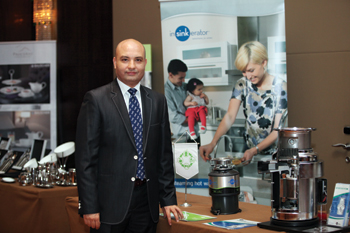Food disposers keep it green and clean
01 December 2014
MOHAMED KARAM (left), senior business development manager, InSinkErator, Middle East and Africa region, highlights how the company’s innovative waste management solutions can address the problems of disposing of food waste in the Gulf.
WASTE production is a growing problem across the world. Growth, urbanisation and rising income levels are fuelling the increase in solid waste production, which has risen tenfold in the past century and is anticipated to double by 2025i. And the Gulf region is no exception.
In fact, Gulf countries rank even higher than any of the developed countries when it comes to per capita waste generation.
Waste management has become a pressing concern for governments across the Middle East. Recycling schemes play an important role in tackling the waste issue, but they do not address the problem of food waste, which can account for up to 55 per centii of waste generated. The environmental pollution created by food waste is far-reaching – accelerating carbon emissions, and affecting land and water use.
Today, there are several options to managing food waste. Landfills are currently the most deployed solution but they come with serious environmental and cost issues. While composting is seen as an environment-friendly alternative, it presents challenges of its own.
 |
|
Disposers offer an environmentally responsible way to disposing food waste. |
Another option that is growing in popularity in developed countries and is gaining traction in the Middle East is the usage of food disposers. Grinding up food waste and sending it down the drain offers a practical and environmentally responsible approach to food waste management. Not only are food scraps kept out of landfills, a well-equipped waste management facility can capture the methane produced from food decomposition and use it to generate renewable energy. In addition, the biosolids from the treatment process can be converted into a nutrient-rich fertiliser and soil conditioner.
As the world’s largest manufacturer of food waste disposers and instant hot water dispensers for home and commercial use, InSinkErator offers high-performance disposers including its Evolution household series and Foodservice Disposer Systems for commercial and industrial purposes.
These disposers not only offer an environmentally responsible way to disposing food waste at home and commercially, they ensure that a high level of kitchen hygiene is maintained.
InSinkErator is firmly committed to the global effort of preserving natural resources and protecting the environment and aims to leverage its products to help drive a 20 to 35 per cent reduction in food waste in the Middle East and North African (Mena) region.
When John W Hammes invented the food disposer in 1927, his practical idea would eventually evolve into a powerful brand – InSinkErator, the world’s largest manufacturer of disposers today.
 |
|
The InSinkErator family of waste disposers. |
The company is proud of its heritage and remain firmly committed to creating customer beneficial solutions that are a strong blend of technology and engineering. It recognises that the Middle East is one of the fastest growing environmental technology markets and believe that its world-class environmentally compliant line of products will address the needs of discerning consumers in the region.
Across the Gulf region and particularly in the UAE, the construction industry is experiencing an upturn, with the sector expected to contribute 11 per cent of the UAE’s GDP (gross domestic product) in 2015iii. This resurgence presents an opportunity to encourage greater adoption of environment-friendly food waste management practices.
InSinkErator’s Evolution products offer households a stylish solution, packed with power and an ultra-quiet performance. The Evolution Excel’s SoundSeal Plus technology reduces up to 60 per cent of disposer noise. In addition, its Multigrind Plus technology deploys three grinding stages to shear, shred, and grind food to a pulp, ensuring that all waste easily washes through household pipes.
 |
|
InSinkErator’s Evolution products offer households a stylish solution. |
InSinkErator is a business concern of Emerson. As part of its brand promise, the firm supports sustainable environmental development in the UAE and the rest of the Middle East. It is a member of the Emirates Green Building Council (Emirates GBC), an organisation aimed at conserving the environment by strengthening and promoting green building practices in the UAE.
InSinkErator products have also passed the Masdar sustainability criteria, resulting in the company’s inclusion in The Future Build, a Masdar initiative, which is the first portal of its kind to originate in the Arab world. The portal (www.thefuturebuild.com) assists architects, engineers and contractors in identifying and sourcing green building products and materials that have been independently assessed and selected according to the same standards and criteria that Masdar City. InSinkErator also partners with universities, researchers and municipalities from around the world, seeking smarter ways for society to convert food waste into renewable energy and fertiliser.
i. Hoornweg, D and Bhada-Tata, P: What a Waste: A Global Review of Solid Waste Management (World Bank, 2012).
ii. Salman Safar: Food Waste, Ramadan and the Middle East (EcoMENA, June 2014).
iii. Construction sector to contribute 11.1 per cent to UAE’s GDP in 2015 (Dubai Chamber of Commerce and Industry, Dec 2012).
- Renault unveils new stars at mega show
- Doka provides total solutions to airport
- Free zone to install air quality monitors
- Food disposers keep it green and clean
- Cat excavator is powerful performer



